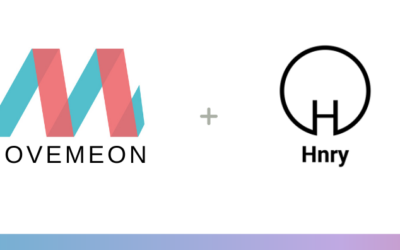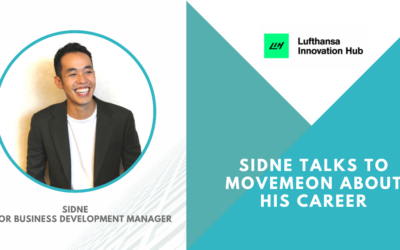In this article, Elizabeth addresses some key questions about moving from consulting to startups and shares her learnings and go-to resources.

I hope this helps fellow consultants thinking of making the leap!
Elizabeth Dlha
Product Manager, Deepnote
—
I left McKinsey to join Deepnote, a seed-stage startup. Going from consulting to the startup world is a well-trodden path, but based on my own experience and the questions I’ve been getting, it’s still a mysterious one for many. In this article, I want to address some of the questions that might be top-of-mind for you, if you’re a consultant thinking of making the leap yourself:
- How do I know I’m ready to make the switch?
- How do I grow my network outside consulting?
- How can I learn about startups?
- Where do I start the job search and how do I navigate job opportunities?
- How do I tell my story?

My journey for context
I interned at McKinsey and joined the company full-time straight after college. I wanted to understand business, travel the world, get to know different industries. I was excited about the relentless buzz, smart people I could work alongside and learn from, the wide range of problems to crack. I hoped consulting would help me navigate the business world, get transferrable skills, and that later I could apply whatever I learnt in different contexts.
McKinsey was a great place to do just that. Two years in, I saw myself moving away from the typical strategy work and working on implementations, seeking out projects that would get me closer to building and co-creating with clients. I wanted to learn more about building products, so I switched into a product role at Periscope, a software arm of McKinsey. Even as a Product Manager, I still had an itch that I couldn’t quite scratch — so I quit and started as employee no.15 at Deepnote, where we’re building a collaborative platform for data scientists.
How do you know you’re ready to make the switch?
Before we get into the nitty-gritty, I want to address a question that I myself asked many times — how do you know you’re really ready to leave consulting? If you’ve already decided, feel free to skip this part.
Staying in consulting does have many benefits — great opportunities, steadily increasing salary, little risk, a lot of diverse experiences you can intertwine into your role (role rotations, geographical mobility), and a bottomless well of challenges and hard problems you can throw yourself at. The potential FOMO is endless and probably grows bigger the longer you stay in consulting. Every day, you are learning new things — some are useful for running a company, others not so much.
My advice here is to really think about where you want to get, and what is the learning that will get you there. Getting that managerial promotion or an MBA might make sense if you want to join a company of your clients’ scale, but it might not be relevant if you want to join an early-stage company or start a business of your own. You can’t learn to build products by a proxy, only by jumping down the deep end. Equally, improving as an analyst won’t make you a better operator, only operating will.
If you feel the itch to leave your job, look around and see if there are opportunities within the company that might move you towards your goal. If the learnings will only side-step you, bite the bullet, and move on.
“It’s important to evaluate how well our aspirations align with the critical path of the environment we are in. Find projects, teams, and companies whose critical path is best aligned with yours.“
– Robert Chang
Jeff Bezos coined the regret minimization framework (of course there’s a framework for this) when he spoke of his decision to leave a Wall Street firm and start Amazon.
“If you project yourself out to age 80, and ask yourself whether you’d regret making this step, it gets you away from daily pieces of confusion, and helps you make good life decisions.” A wise friend of mine reiterated this for me — “consulting companies, MBA degrees, all of these long-standing institutions will always be there for you — a high-growth opportunity might not.”
So what would your 80-year old self say?
How to make the leap?
Consulting and startup worlds are radically different, but similar in their intensity and the level of commitment they require if you want to succeed. I did not know much about startups aside from my romantic ideals, and what I learned from Jared in the Silicon Valley show, so learning about the startup world itself before moving on to the actual job search was crucial.
1. Grow your network outside consulting
Someone at McKinsey famously remarked it’s “less than a life, but more than a job” — but I found it all-consuming nonetheless. I would spend most of my week at work, and then hang out with my colleagues on weekends. If that sounds nothing like you — more power to you. If that’s all too familiar, I suggest you take a step outside of your bubble and start speaking to non-consultants.
Growing your network helps you understand what’s out there, and get a feel for where you could fit in. Your clients are most likely leading corporations, so your professional connections won’t help you with the job search, and great early-stage job postings on LinkedIn are rare and gone before you know it.
Here’s a couple of tips on how you can start growing your network:
- Reach out to alumni from your company — McKinsey has an amazing Alumni Center that allowed me to search through a global network of people who had been in the same shoes, moved on to do extraordinary things, and when I reached out, they were empathetic and happy to help. I suppose most consultancies will have a resource like this — at the end of the day, investing in alumni and nurturing the relationships is consulting’s bread & butter. Even if your company does not have a dedicated database, try asking around — supportive colleagues and leadership can share their own leaving stories, or connect you with relevant alumni. You can also reach out to people from other consulting firms via LinkedIn or Twitter, they can relate to your pivot even if you’re not coming from the same company.
- Meet strangers — Lunchclub (or the Russian Random Coffee) are great resources for meeting interesting people outside of your domain. You just have to sign up, complete your profile, set the goal for your conversations and who you want to talk to (like a founder, investor, product, or a technical expert) — Lunchclub algorithm then connects you with up to 6 people every week. All sessions are now fully online, so you can set your location preference and get networking.
Once we are able to meet in person again, Movemeon has frequent events for startup founders, freelancers, strategy, and commercial professionals. Follow Movemeon on Linkedin to be notified of new and upcoming events.
- Join a community of people on the same boat — While I don’t have the first-hand experience here, I’ve heard great things about career change programs like Grand Quest or community-based fellowships like On Deck (especially the On Deck First 50 or On Deck Founders might be relevant).
These programs do require a substantial time commitment, but if you’re convinced it’s the right time to make a move, they can help you navigate the decision-making process, get professional guidance and you can meet inspiring and like-minded people along the way.
2. Learn about the startup world
Consulting is a bubble — the words you use, the way you talk, and the clothes you wear probably scream “consultant”. The problems you’re solving rely on repeating proven recipes and blueprints in a new context. Getting impact does not necessarily always mean cracking the hardest problems, but instead, finding out what works for your client’s organization — and then building conviction and buy-in to get the results. Whilst the pressure is high, in the grand scheme of things, there is zero ambiguity. The project length, structure, and the to-do list are often laid out even before you join the team. The hard part is taking that high-level roadmap, and making things work under pressure.
Startups are different. You’re solving challenges that are hard in a different sense — often facing problems that have never been solved before. Many concepts that move the needle in startups can also be counterintuitive to a consultant: MVP and “better done than perfect”, pragmatism about resources, mission obsession, not caring so much about best practices and “state-of-art”, not over-engineering everything — simply finding out what works quickly, getting the job done and moving towards the next milestone. You have to understand that mindset before starting your job hunt. Would you even enjoy this type of work? Ease yourself into these topics before starting to have real conversations, and give yourself ample time to do this.
Here are a couple of resources I found helpful when making the leap.
🧑🎓Courses
- How to start a startup — I highly recommend this if you don’t know where to start. This is a free series of ~1-hour recordings where startup legends share their take on different topics with Stanford students, and it also comes with a list of great reading resources.
- YC’s Startup School — A great resource if you’re looking to start a company of your own. If you can’t commit to the full program, you can also check out Startup Library, where YC shares some of the content that makes up the core Startup School curriculum.
📚 Reading
- Movemeon’s startup insights and career advice
- Paul Graham Essays
- Marc Andreessen’s Guide to Startups
- High Growth Handbook by Elad Gil
- The Hard Thing About Hard Things by Ben Horowitz
- Zero to One by Peter Thiel and Blake Masters
- The Generalist newsletter
- Newcomer newsletter
- Techcrunch
- Hacker News
- Julia DeWahl’s article How to make the leap from consulting to a startup
- David Liao’s article How to make the move from consulting to startup
🎧 Podcasts
- Masters of Scale — a podcast hosted by Reid Hoffman (PayPal, LinkedIn, Greylock) where he analyses different topics with founders that scaled successfully.
- How I Built This — Guy Raz interviews entrepreneurs on how they built things.
- The 20 minute VC — Harry Stebbings interviews people from the VC industry and founders in conversations that rarely take 20 minutes.
- Clubhouse — Great talks are hosted here daily. I recommend you sign up and follow a couple of people (like Naval, Ben Horowitz, Marc Andreessen, Ryan Hoover) and clubs (e.g., Startup Club, A16Z) so that you get notified when they’re online and pop into relevant conversations.
I did not have Twitter for the longest time, and I was missing out on some major startup knowledge. TL;DR — Get Twitter and follow everyone and anyone that might be an inspiration on your journey.
Here are some of the accounts that broadened my understanding of the startup landscape:
- Paul Graham
- Tracy Chou
- Sam Altman
- Ryan Hoover
- Andrew Wilkinson
- Keith Rabois
- Andrew Chen
- Li Jin
- Patrick O’Shaughnessy
- Movemeon – frequently share new job opportunities
3. Learn to tell your story
This one is not easy — especially if you’re like me, someone hired into consulting straight out of college, with little/no idea of the value they can bring. You can’t sell yourself to a founder (especially a technical founder) the same way you’d sell yourself to a client or a partner at a consulting firm. Especially if you’re interested in a specific function like product or sales — you will automatically have lower leverage in those conversations than someone with relevant training.
Here is my humble perspective of what consultants can bring to the table in early-stage startups. I can’t really speak to post-seed companies, but I assume some of these are relevant across the board:
- Getting stuff done — Especially if you join an early-stage company, you will have to wear many hats, make strategic decisions quickly, but also get the stuff you think up done — there is no one else to do the work. Showing that you are driven and smart, but also eager to get your hands dirty will get you far. You’ll no longer be the manager, the thinker, or the analyst — you will be the maker, so get comfortable with that and make sure to communicate that to others too.
- Learning quickly — A lot of the success of being a consultant relies on the ability to absorb a lot of information, ramp up and rapidly mold yourself into a different context. As a strategy consultant, you are trained to be a generalist. So while you may not have the 4 years of B2B account management experience or the market understanding that another candidate has, speak to the fact that you can learn these things extremely quickly, and by the virtue of being a generalist, you can bring value beyond the role description.
- Being independent and proactive — Oftentimes, there is no one to tell you what to do. If your role relates to growth, the founders might have an idea of what they’d like to accomplish, but you will ultimately be the person thinking about this the most, and driving the growth agenda. Show evidence that you can take ambiguous problems, break them down into manageable chunks and drive to solutions — that is ultimately what you’re best at as a consultant.
- Building relationships — Relationships are the bread & butter of consulting. Building a startup is relationship-building on steroids: you are building a company out of thin air, which means talking to investors, influential people in your domain, reaching out to other startups for advice. Show that you’re up for the challenge.
Once you have the building blocks, practice your story. I found it helpful to use a framework that Marissa Mayer used when moving across different roles at Google and Yahoo — “I started working at {your consulting company} to learn X and Y, now I want to join {your dream startup} to apply this, help your company move to point A and learn B.”
4. Get on with the job search
When doing the actual job search, there are many things to consider when filtering job opportunities — industry, product, company stage, team size, the role, geography, and more. Ultimately, you will have to think about how important each of these aspects is for you and prioritize the 2–3 things you won’t compromise on.
When it comes to choosing the right industry / product domain, maybe some of your client work gave you an indication for where to look and what topics make you excited. If you have no clue, keep an open mind and speak to anyone and everyone. Having said that — when going into any hiring conversation, make sure you have tested the product (if possible), and can speak to the company’s vision and users they serve. Startups are user- and product-obsessed, so not knowing this is an instant red flag.
The size of the team and company stage are other things to get clear on. The earlier the company, the broader role you will take on, spreading yourself across multiple domains — your generalist background can be a perfect fit here. If you’re looking at more mature startups, make sure you identify roles where you can bring the most value. Unless you have prior background in a certain function, it will be hard to apply for a function-specific role against someone with relevant experience. Traditionally, consultants are well-suited for Business Operations, Analyst, Internal consultant, and Chief of staff roles (if you like the sound of that, I highly recommend this great essay on The Chief of Staff role in Silicon Valley by Julia Wahl). As a generalist, you might also be a great fit in Account Management/Sales roles at later-stage B2B companies.
To get started on your job search journey, pump up your LinkedIn, connect with companies like Movemeon. There is a large job market for ex-consultants, and platforms like Movemeon can help you connect with interesting startup opportunities based on your background and preferences.
Good luck, and remember — while consultancies hire the best talent because they can afford it, startups cannot afford not to — so don’t sell yourself short.
Explore current opportunities on Movemeon.com
Solve a business challenge, hire a Movemeon professional.
Movemeon supports organisations to hire all over the world.



